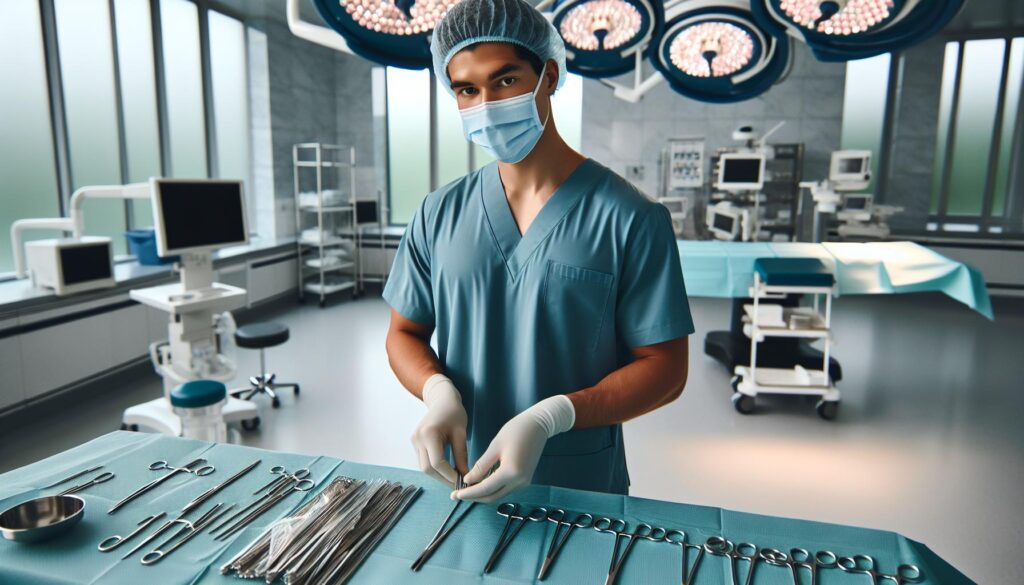Surgical technologists play a vital role in modern operating rooms serving as essential members of surgical teams. These skilled professionals work alongside surgeons nurses and other healthcare providers to ensure procedures run smoothly and maintain strict sterile conditions. From preparing operating rooms to handling surgical instruments surgical techs perform numerous critical tasks that directly impact patient safety and surgical outcomes. They’re responsible for setting up sterile fields arranging equipment and anticipating the surgeon’s needs throughout each procedure. This demanding role requires extensive knowledge of surgical procedures anatomy and medical terminology combined with exceptional attention to detail.
What Surgical Tech Do
A surgical technologist functions as a highly trained healthcare professional who assists surgeons in operating rooms. These specialists work directly with surgeons performing 3 primary roles: maintaining sterile conditions, managing surgical instruments during procedures and monitoring patient safety.
Surgical technologists possess specialized certifications from accredited programs that include:
- Operating room safety protocols
- Sterilization techniques
- Surgical equipment management
- Human anatomy knowledge
- Medical terminology expertise
The position requires specific educational qualifications:
- High school diploma or equivalent
- Completion of a surgical technology program (12-24 months)
- National certification through NBSTSA
- State licensure (requirements vary by location)
Key responsibilities of surgical technologists include:
- Setting up sterile field before procedures
- Preparing patients for surgery
- Passing instruments to surgeons
- Counting surgical supplies
- Managing specimen collection
- Applying sterile dressings
| Work Environment Stats | Percentage |
|---|---|
| Hospitals | 73% |
| Outpatient Centers | 15% |
| Physician Offices | 10% |
| Dental Offices | 2% |
- Surgeons
- Anesthesiologists
- Circulating nurses
- Surgical assistants
- Operating room nurses
- Radiologic technologists
Key Responsibilities in the Operating Room

Surgical technologists perform essential duties before, during and after surgical procedures. Their responsibilities focus on maintaining sterile conditions, managing surgical equipment and providing direct assistance to the surgical team.
Preparing the Surgical Suite
Surgical technologists arrange operating rooms according to specific procedure requirements. They sterilize surfaces, set up back tables with sterile instruments and verify the functionality of surgical equipment like lights, suction devices and monitoring systems. The setup process includes arranging sterile drapes, positioning surgical lights and organizing instrument trays in their proper sequence of use.
Managing Surgical Equipment and Supplies
Surgical techs maintain accurate counts of surgical instruments, sponges and other supplies throughout procedures. They inspect instruments for proper functionality, manage inventory levels and document usage of surgical materials. Supply management responsibilities include:
- Tracking instrument counts at procedure start, during closing and after completion
- Organizing specialized instrument sets for specific surgical procedures
- Maintaining sterile field integrity when handling equipment
- Preparing specimen containers and managing biological samples
- Passing instruments, sutures and supplies to the surgical team
- Holding retractors and managing surgical site exposure
- Suctioning fluids and managing specimen collection
- Applying dressings and securing surgical sites
- Monitoring sterile technique compliance among team members
- Supporting emergency interventions when complications arise
Pre-Operative Duties
Surgical technologists execute essential pre-operative responsibilities to ensure successful surgical procedures. These duties focus on creating a safe sterile environment preparing both the operating room equipment.
Patient Preparation
Surgical technologists perform specific patient preparation tasks:
- Position patients on operating tables using proper body alignment techniques
- Attach monitoring equipment including ECG leads pulse oximeters
- Apply safety straps tourniquets antiembolism devices
- Clean incision sites with antiseptic solutions following standardized protocols
- Transport specimens to laboratory facilities for analysis
- Document patient positioning equipment settings vital signs
Sterile Field Setup
The sterile field setup involves systematic preparation steps:
- Arrange back tables mayo stands in specified configurations
- Open sterile instrument packs supplies maintaining aseptic technique
- Count surgical instruments sponges needles with circulating nurse
- Organize instruments in order of use based on procedure requirements
- Verify expiration dates sterility indicators on all supplies
- Test equipment functionality including lights suction devices cameras
- Place sterile drapes over patient furniture following established protocols
| Category | Minimum Items |
|---|---|
| Surgical Instruments | 40-60 pieces |
| Sterile Drapes | 8-12 sheets |
| Suture Materials | 15-20 packets |
| Disposable Items | 30-40 pieces |
Intra-Operative Support
Surgical technologists provide critical intra-operative support by managing surgical instruments and maintaining sterile conditions throughout procedures. Their actions directly impact surgical outcomes and patient safety.
Handling Instruments and Materials
Surgical technologists anticipate surgeons’ needs by passing instruments in precise sequences based on procedural steps. They maintain organized back tables with instruments arranged in order of use: retractors, hemostats, forceps, scissors. During procedures, they:
- Track instrument counts at 3 key points: opening, closing, final verification
- Load suture needles into needle holders before passing to surgeons
- Position retractors to maintain optimal surgical field visibility
- Manage specimen containers according to laboratory protocols
- Replace contaminated instruments with sterile alternatives immediately
- Monitor surgical team members’ compliance with sterile field boundaries
- Identify breaks in sterile technique and implement corrective actions
- Change contaminated gloves and gowns following standardized protocols
- Keep sterile surfaces visible and maintain proper distance from non-sterile areas
- Apply additional sterile drapes as needed during lengthy procedures
| Sterile Field Monitoring Points | Frequency |
|---|---|
| Instrument verification | Every 60 minutes |
| Glove integrity checks | Every 90 minutes |
| Surface barrier assessment | Every 30 minutes |
| Team compliance review | Continuous |
Post-Operative Responsibilities
Surgical technologists execute critical post-operative duties to ensure proper room turnover and accurate documentation after procedures. These responsibilities focus on maintaining sterility standards while preparing for subsequent surgeries.
Operating Room Turnover
Surgical technologists perform systematic room turnover procedures in 15-20 minutes between cases. Their tasks include:
- Disposing biohazardous waste in designated containers
- Removing used surgical instruments to decontamination areas
- Wiping down all surfaces with EPA-approved disinfectants
- Replacing surgical table linens with fresh sterile drapes
- Restocking supplies based on procedure cards
- Setting up new sterile back tables for upcoming cases
- Labeling specimens with patient identifiers time stamps location codes
- Recording specimen details in tracking systems
- Packaging specimens in appropriate preservation solutions
- Completing chain of custody forms for laboratory transfer
- Documenting instrument counts in electronic medical records
- Recording supply usage for inventory management
| Documentation Type | Required Elements |
|---|---|
| Specimen Labels | Patient name DOB procedure date time surgeon name specimen type |
| Count Sheets | Initial counts closing counts instrument names quantities |
| Supply Records | Item codes quantities lot numbers expiration dates |
| Room Turnover Log | Start time completion time cleaning verification staff initials |
Career Path and Advancement
Surgical technologists advance through multiple career stages, starting with entry-level positions in operating rooms. Entry-level techs typically begin in general surgery departments, gaining experience across diverse surgical procedures.
After 3-5 years of experience, surgical technologists qualify for specialized roles in:
- Cardiovascular surgery
- Neurosurgery
- Orthopedic surgery
- Pediatric surgery
- Trauma surgery
Advanced certification options include:
- Certified Surgical First Assistant (CSFA)
- Certified Surgical Technologist Advanced (CSTA)
- Registered Perioperative Nurse (RN)
| Career Level | Years Experience | Average Salary |
|---|---|---|
| Entry Level | 0-2 | $41,000 |
| Mid-Level | 3-5 | $52,000 |
| Senior Level | 6+ | $65,000 |
| Specialized | 8+ | $75,000 |
Leadership opportunities include:
- Operating Room Team Lead
- Surgical Services Manager
- Clinical Educator
- Department Supervisor
- Medical Sales Representative
Educational advancement paths offer:
- Associate degree programs in surgical technology
- Bachelor’s degrees in healthcare administration
- Specialized certifications in robotic surgery
- Training programs in minimally invasive procedures
- Medical device technology courses
- Higher compensation rates
- Diverse surgical exposure
- Flexible scheduling
- Housing allowances
- Professional networking opportunities
Surgical technologists stand as essential pillars in modern healthcare. Their specialized skills expertise and unwavering commitment to patient safety make them indispensable members of surgical teams across various medical settings. From maintaining sterile environments to managing complex surgical instruments these professionals ensure smooth efficient and successful surgical procedures. The field offers robust career advancement opportunities with competitive salaries and diverse specialization paths. As medical technology continues to evolve surgical technologists will remain crucial partners in delivering high-quality surgical care making this career path both rewarding and sustainable for those passionate about healthcare.



